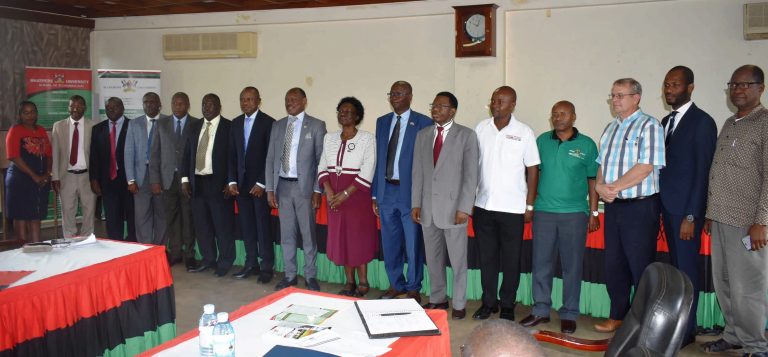
KAMPALA – Environment for Development Initiative (EfD–Mak) Centre has hosted its first policy dialogue on Governance and Natural Resources at the Senate Conference Room, Makerere University.
The event attracted over 150 participants from the public and private sector, research institutions, civil society organizations, representatives from government ministries and agencies, development partners, staff and students from Makerere University among others.
Makerere University Vice-Chancellor Prof Barnabas Nawangwe expressed hope for continued partnership in research and policy development.
Prof. Nawangwe observed that unlike the past when villages were covered with natural vegetation with plenty of trees and wild animals with readily available land for food production, today, most parts the country is growing into urban settings, largely unplanned, eating up all the agricultural land with families looking forward to town dwellers to give them food.
“This transformation is a big problem that all of us in academia, policymakers, and implementers in government must handle serious and the issue of high population growth putting a lot of pressure on natural resources.
Natural resources are crucial sources of ecosystem service provision and are potential drivers of development. This is only true provided that research-based policies are put in place to sustainable use these resources inappropriate boundaries”, he said.

He noted that initiatives like the EfD are important in countries where the majority of people depend directly on the soil, water, forests, and fisheries for their livelihoods.
“We as Makerere University appreciate the relevance of Environment and Natural resources in fostering economic development.
However, for the environment and natural resources to play this role, governance is supposed to be at its best.
There are existing policy gaps that may hinder the sustainable utilization of the environment and natural resources and this includes the human capacity resource gap, knowledge gap, the communication gap, and the institutional gap. However, we are glad that EfD Secretariat gave us this opportunity as Makerere university to host this centre”, Professor Nawangwe added.
The Vice-Chancellor affirmed that through commitment and dedication staff affiliated to this center, the university will bridge the nation gaps and act as a hub for quality training, research, and policy engagement in environmental economics and development in the Africa region and beyond.
The Principal Makerere University College of Business and Management Sciences (CoBAMS) Prof. Eria Hisali hailed the EfD-Mak Centre for setting off very well despite the fact that it is young.
“What is gratifying to note is as much as you are young, you started on a good note. I have been following a number of activities and this is unique of a very young centre like this”, Prof. Hisali commended.
Prof. Hisali extended appreciation to the EfD Secretariat in Gothenburg for the support accorded to the EfD-Mak centre.
“One unique thing is in as much as they offer support to the centre, they are walking with us in all steps unlike many donors who give money and leave”, the Principal noted.
Prof. Hisali welcomed and thanked the government, the private sector, donors and civil society organization, staff and students for sparing time to participate in the dialogue saying the day’s activities will offer a platform for enduring relationships.
He said the theme of the dialogue is not only important but timely on the reason that in the next twenty years Uganda’s economy will rely on natural resources with the discovery of oil.
“At CoBAMS we recognize the fact that the economy is to be shaped by natural resources. In addition to center activities, we have mainstreamed the emerging issues in our strategic plan 2020-2030. We have reviewed the curriculum to mainstream and reinforce initiatives like this”.

To move forward Prof. Hisali proposed the idea of creating policy labs where the university would meet selected policymakers once quarterly to address a topical issue and come up with policy brief to increase ownership and acceptability.
“Environment is the mother of all disciplines. However, governance of the environment has been the biggest challenge in developing countries and those with rich natural resources. For example, countries like DR Congo and Sudan have bad governance index. Uganda is slightly better but not good either. We want to be like Norway. We are doing badly in terms of accessing, using, sustainability and policy implementation”, Prof. Mugisha who is also Dean School of Agricultural Sciences said.
Prof. Mugisha said agriculture is the biggest culprit in destroying the environment as forests and wetlands are converted into farmlands and therefore, should be held responsible for restoring the environment.
“That is why the CAES teamed up with CoBAMS. We need policymakers to do this. Our EfD-Mak centre is to champion the drive to understand the environment better, generate and share imperial work, develop strategies to ensure a wealthy environment and develop the capacity for all to enjoy a healthy environment”. Prof. Mugisha explained.
Speaking on the evolution of the EfD Initiative, the representative of the EfD secretariat Sweden Franklin Amuakwa-Mensah said the EfD initiative started in 1991 as a Capacity-building supported by Sida and has so far produced 45 PhDs from Global South and more than 300 Ph.D. courses.
The platform he said was tested in Ethiopia in 2003 and rolled out when the department of economics at the University of Gothenburg Sweden sent proposals to Sida to create centres to engage in policy.
In 2007, Mr. Amuakwa-Mensah said six centers were launched in developing countries, and by 2019, 15 EfD centers had been set up with many partners include that of Makerere.





